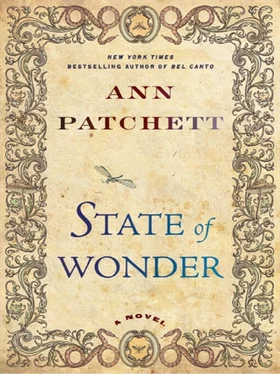“It has nothing to do with me? Then why am I here? If this
has nothing to do with me then I would very much like to come
home now.”
In truth, she did not care. She did not care that the Lakashi were having 3.7 times the number of children as compared to other indigenous Brazilians over the course of their lifetimes. She didn’t care where they lived or if they were happy or if they wanted the children they had. What she did care about, cared about very much in fact, was that her employer, who had virtually proposed marriage and then sent her off to the equator after one of Vogel’s employees had died there, now refused to share with her the basic information of the research in question. “When I find Dr. Swenson and all those pregnant Lakashi people, am I supposed to avert my eyes so I won’t figure out how they’re managing this? Do they make it a practice of killing anyone who finds out their secret?” And then she saw Anders standing ankle deep in the muddy river, holding a single blue envelope in his hand. “My God,” she said. “My God, I didn’t mean that.”
“They chew some sort of bark while it’s still on the tree,” Mr.
Fox said.
Marina did not care at all about the bark or the trees. “I didn’t mean that.”
“I know,” he said, but all the light had gone out of his voice, and in another couple of sentences they had wrapped it all up and gotten off the phone. Marina put her shoes on and went back out into the street. The rain had stopped and the sun was beating the pavement and buildings and people and dogs into a flat sameness. She didn’t want to walk to the river or the market hall and so she walked for a while around the square in the choking humidity thinking of how Anders must have walked around the square as well. Maybe he hadn’t felt hopeless when he came here. Maybe he was glad to go on day-long birding excursions into the jungle and drink pisco sours alone at the bar at night. Marina bent over to look at the carved trinkets that a group of natives were selling off a blanket. She picked up a bracelet that could have been smooth painted beads or red seeds with holes drilled through the centers. She let the woman on the blanket tie it to her wrist with a complex and permanent set of knots and then bite off the ends, her lips somehow never touching skin. One of the children, a narrow-chested boy of nine or ten, looked through the menagerie of tiny carved animals that were spread out in front of him and picked out a white heron that was two inches high, a tiny fish caught in the needle of its beak, and he handed it to her. Marina had meant to refuse it, but once she held it up she thought it was in fact very fine, better than anything else she had seen, and so she agreed to buy the heron and the bracelet for a handful of bills she thought worked out to be about three dollars U.S. She put the little bird in her pocket and walked down a series of side streets, careful to keep all her turns in mind. She wasn’t in the mood to get lost. The farther she walked the more she noticed that no one was looking at her. The small boys with stacks of T-shirts and dazzling butterflies pinned to boards inside cheap wooden frames didn’t follow her. The ice cream vendors didn’t call to her, nor did the man with the mustache and a small monkey on each shoulder who was barking at tourists in Portuguese. With her black hair caught back in a barrette beneath the hat she’d bought and her cheap clothing and her flip-flops, she was able to pass in Manaus the way she was never able to pass in Minnesota. Here they looked at her and seeing someone who looked something like a woman they knew, looked away. When she was spoken to it was only a simple greeting, that much she understood, and she nodded her head in recognition and kept walking. Anders would have been mobbed everywhere. He was so blue-eyed and overly tall, his skin was very nearly luminous, as unfamiliar to these people as snow itself. Any passerby could see deeper into Anders than he could the Rio Negro. Marina thought of all the times he’d come to work on Monday after a weekend spent paddling the boys around some lake in the summer, and how his skin would be scorched, his lips and nose already starting to peel. “Haven’t you heard of sunblock?” Marina said. “Hats?”
“They keep all that information from men.” He didn’t wear a tie to work on those days and his shirt collar stayed open. The sore, red visage of his neck was something Marina made a point not to look at. Who thought it would be a good idea to send Anders to the equator? Her own skin was darker now. The sun had extended its reach past the hats and creams. It was inevitable.
When Marina turned again, a turn that was as aimless as all the others she had made, she found herself back at Rodrigo’s store. There were no crowds out front this time, no one peering in the window. In the daylight it didn’t appear to be such a compelling attraction. The street outside was empty of people, empty of cars. In fact when she went inside, thinking she would say hello, buy a bottle of water, there was only one young couple in the store, a man and woman in their twenties pointing up to something that was over their heads. The woman was long-limbed and tan in a red sundress and she stretched to try and reach for whatever it was she wanted. Her long yellow hair, which was held away from her face by a large pair of sunglasses pushed back on her head, was the brightest aspect of the room, as it seemed that Rodrigo was no more inclined towards electricity during the day than he had been at night. The young man, who may have been a little taller than the woman, stood back in his T-shirt and baggy shorts and watched her stretch. His hair was pale brown and shaggy and his face, which was nearly too pretty, was half covered up in what was either a beard or several days spent not shaving. They hadn’t noticed her come in, and so Marina watched them, in part because they made an unusual sight for Manaus, and in part because she was sure that they were the Bovenders.
She had pictured the Bovenders as being closer to her own age, without any of the drama inherent to so much bony attractiveness, but the minute she walked in the store she revised the imaginings of her idle mind. There was a tattoo banding the young man’s ankle, a decorative vine, and around the woman’s ankle a small gold chain. Marina had exactly one word of description to work from, bohemians, and these were the only two bohemians she had seen in three days.
Rodrigo came into the store from a room behind the counter. He told the couple something in Portuguese and the young woman disagreed and once again reached above her head helplessly while the young man folded his arms across his chest. Was it the soap pads she wanted? When Rodrigo turned for the ladder he saw Marina standing just inside the open door and in the course of a single second he placed her, remembered who it was she wanted to find, and was pleased at the luck of being the one to make the introductions. “Ola! Dr. Singh!” he said, and when the young couple turned to see who it was Rodrigo knew, he opened his hands towards his other guests. “Bovenders.”
The young Bovenders, in possession of a highly evolved social instinct, were beaming as they walked towards her. If they had been working to avoid her they were masters at hiding it. In fact, it seemed as if meeting her in this store on this afternoon was the very thing they were most looking forward to in all the world and they would not hold it against her that she had come a little late. “Barbara Bovender,” the young woman said, extending her hand. She smiled to show the slight disorder among her large white teeth.
“Jackie,” the young man said, and Marina shook his hand as well. The accent she thought was Australian but she wasn’t positive. They seemed too tan to be English.
Читать дальше












